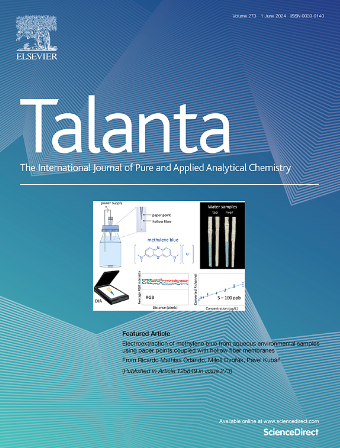Development of an SI-traceable magnetic solid-phase extraction coupled with isotope dilution LC-MS/MS method for accurate quantification of alpha-fetoprotein in human serum
IF 5.6
1区 化学
Q1 CHEMISTRY, ANALYTICAL
引用次数: 0
Abstract
Alpha-fetoprotein (AFP) is a critical biomarker widely used for the screening and diagnosis of hepatocellular carcinoma and germ cell tumors. Although immunoassays are commonly employed for AFP detection, significant discrepancies in measurement results across different laboratories persist due to poor harmonization among methods. To improve the accuracy and harmonization of AFP quantification, this study developed a novel magnetic solid-phase extraction coupled with isotope dilution liquid chromatography-tandem mass spectrometry (MSPE-ID-LC-MS/MS) method for the precise measurement of AFP in serum. The method utilizes high-affinity AFP antibodies cocktails conjugated with magnetic nanoparticles to enhance the recovery of low-abundance AFP, combined with optimized elution conditions to ensure analytical reliability. The protocol involves one-step denaturation and alkylation, followed by tryptic digestion. This enables accurate quantification with SI-traceability using three signature peptides. Method validation demonstrated that intra- and inter-day precisions were <10 %, recovery rates of 99.8–101.4 %, and the limit of quantification (LOQ) of 1.5 ng/mL. This work establishes a metrologically robust reference procedure for AFP measurement and paves the way for standardization of clinical protein assays.

si可追溯磁固相萃取-同位素稀释LC-MS/MS法测定人血清中甲胎蛋白含量
甲胎蛋白(AFP)是一种重要的生物标志物,广泛用于肝细胞癌和生殖细胞肿瘤的筛查和诊断。虽然免疫测定法通常用于AFP检测,但由于方法之间的协调性差,不同实验室的测量结果存在显着差异。为了提高甲胎蛋白定量的准确性和一致性,本研究建立了一种新型的磁固相萃取-同位素稀释液相色谱-串联质谱(MSPE-ID-LC-MS/MS)方法,用于血清中甲胎蛋白的精确测定。该方法利用高亲和AFP抗体鸡尾酒结合磁性纳米颗粒来提高低丰度AFP的回收率,并结合优化的洗脱条件来确保分析的可靠性。该方案包括一步变性和烷基化,然后是胰蛋白酶消化。这使得使用三个特征肽的si可追溯性精确定量。方法验证表明,日内、日间精密度为10%,回收率为99.8 ~ 101.4%,定量限为1.5 ng/mL。这项工作建立了AFP测量的计量稳健的参考程序,并为临床蛋白质测定的标准化铺平了道路。
本文章由计算机程序翻译,如有差异,请以英文原文为准。
求助全文
约1分钟内获得全文
求助全文
来源期刊

Talanta
化学-分析化学
CiteScore
12.30
自引率
4.90%
发文量
861
审稿时长
29 days
期刊介绍:
Talanta provides a forum for the publication of original research papers, short communications, and critical reviews in all branches of pure and applied analytical chemistry. Papers are evaluated based on established guidelines, including the fundamental nature of the study, scientific novelty, substantial improvement or advantage over existing technology or methods, and demonstrated analytical applicability. Original research papers on fundamental studies, and on novel sensor and instrumentation developments, are encouraged. Novel or improved applications in areas such as clinical and biological chemistry, environmental analysis, geochemistry, materials science and engineering, and analytical platforms for omics development are welcome.
Analytical performance of methods should be determined, including interference and matrix effects, and methods should be validated by comparison with a standard method, or analysis of a certified reference material. Simple spiking recoveries may not be sufficient. The developed method should especially comprise information on selectivity, sensitivity, detection limits, accuracy, and reliability. However, applying official validation or robustness studies to a routine method or technique does not necessarily constitute novelty. Proper statistical treatment of the data should be provided. Relevant literature should be cited, including related publications by the authors, and authors should discuss how their proposed methodology compares with previously reported methods.
 求助内容:
求助内容: 应助结果提醒方式:
应助结果提醒方式:


